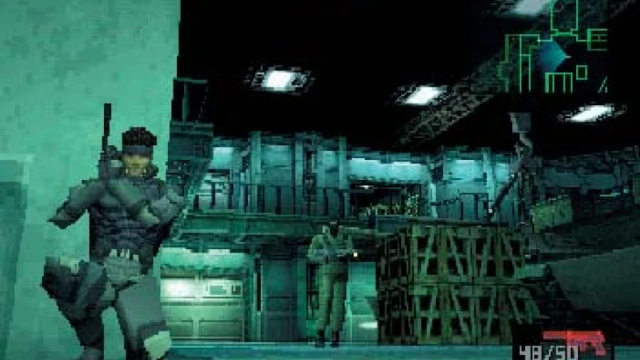Metal Gear Solid can essentially be described as Rambo: First Blood Part 2 meets JFK. Whilst then premise of the first game lifts from a variety of sources – the basic idea of being airdropped into enemy territory to rescue a hostage is lifted from Escape From New York, the spy technology is lifted from James Bond (particularly Thunderball and all the marine tech), and the whole thing can be seen as a riff on Die Hard – the first hour of the game lifts most of its structural action from Rambo II, with every single scene from the first twenty minutes or so having an analogue somewhere in the first hour of MGS. The protagonist is called from exile to perform one last mission; the protagonist is walked through his new tech; the protagonist is sent into enemy territory with no backup to perform spy work. It’s actually harder to explain than I realised, but but it’s perfectly clear to anyone familiar with both works. Snake’s CO is even physically based on Troutman.
Much of the style and structure, however, feels lifted from JFK. Much of my thought on this comes from both works relying heavily on conveying a lot of exposition in long monologues intercut with stock footage, but it’s also a vibe that is, again, harder to express than I realised. Both stories are about a single individual unpacking a dense conspiracy, with a strong sense of overheated melodrama. I suppose there’s a perspective that what is messy and undisciplined in JFK was cleaned up in Metal Gear Solid – that is to say, Hideo Kojima recognised the unfolding of the mystery in JFK and worked out how to deliver the same experience more efficiently, on an overall structural level if not on a moment-to-moment level. As this is an element of style the series would both develop and stagnate, I’ll include some examples from later games:
(Notice all these scenes are way too fucking long)
What’s interesting about this exercise and what makes it worthy of an article as opposed to me just farting about in my notepad is that it ends up revealing what’s original about Metal Gear Solid and can’t really be attributed to its influences. There is obviously the way MGS takes both the action and the philosophy much further than either of these two works, and it does it through vivid and original characters – one could say its unique contribution is a genuine interest in human beings. This is most obvious with Snake, who is every much the cliche that Rambo defined in terms of action heroes, but has both a greater emotional depth and a more sophisticated and poignant conclusion.
The same goes for the conspiratorial mindset that Oliver Stone demonstrates in JFK – Metal Gear Solid is also outraged by the idea of a world where governments kill, manipulate, and cover up, but it shows how people choose to live in that world. I had a conversation once with a 9/11 Truther, and when I asked her what her end goal was – when you ‘expose the truth’, what exactly do you want people to do about it – she was genuinely confused by the question. I can picture Oliver Stone being equally confused (in fairness, I could imagine his response would be wanting responsible parties to go to jail) whereas Hideo Kojima would then pull out a manifesto. Like all good stories, Metal Gear Solid takes its ideas and asks how to live in a world with them. Like all good stories, it’s about people we care about.
What are stories you could describe through two antecedents?

